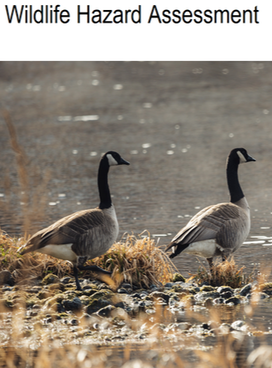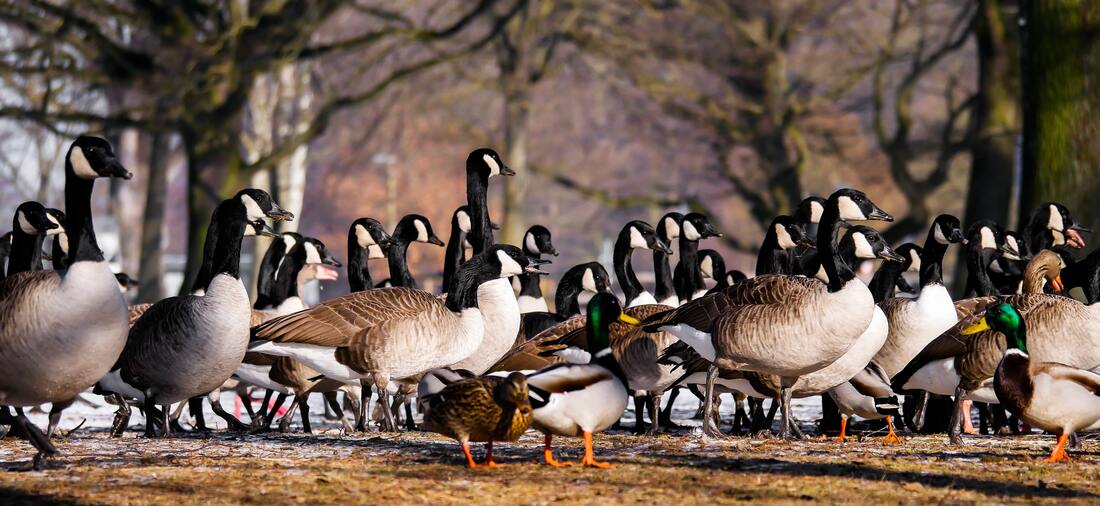 One of the biggest battles when it comes to goose control especially in the Northeast states of New York, New Jersey, Connecticut, and Massachusetts is time! The weather and change of seasons are extremely unpredictable. One minute you’re shoveling snow after a nor ’easter storm the next you’re planting spring flower boxes. But that is more reason in the world of wildlife management time is of the essence! When it comes to Goose Control nothing is harder to do than re-rout a Canada Goose population once they have selected where they will nest and lay their eggs, as well as undergo their molting season. Adult Canada geese molt (completely replace flight feathers) each summer and cannot fly during this six-week period. After adults have completed the molt and young geese grow their first flight feathers, they begin to travel in flocks. Resident Canada geese usually move only short distances for the winter. Federal law protects Canada geese. It is illegal to harm geese, their eggs, or their nests in the United States without permission from the U.S. Fish and Wild Service (USFWS). Geese may be harassed or scared away without a permit if the geese, goslings, eggs, and nests are not harmed. USFWS allows resident Canada goose eggs to be treated to prevent hatching after simply registering online (details below). PROBLEMS AND DAMAGE A flock of Geese can cause quite a bit of damage to your property and if they make it an annual process, that can get costly. In that case you should be on the phone and calling Loomacres Wildlife Management to solve your problem and prevent further damage. Here are some examples of what damage geese can cause.
BE PROACTIVE Because time is the key factor in a successful goose management plan, being proactive is essential especially early on before Canada Geese start mating and nesting on your property. In most cases, it is ideal to install goose control devices during the last week of February or the first week of March. However, in the northeast depending on the winter and spring storms, this may be delayed till early April in states like New Jersey and Downstate NY. Keep in mind that migratory patterns, molting and brooding season for Canada Geese vary depending on your location; you may need to do research and adjust your projected installation date. Check with local wildlife sources or give us a call to figure out the best time to implement goose control devices such as harassing or hazing. Scaring geese away so they learn your site is not a safe place—works better before geese become strongly attached to a site. The longer geese have used a site, the harder it will be to get them to move. Geese are also more willing to relocate before they establish nesting territories in early spring and again after goslings are flighted in late summer. Using techniques developed to manage livestock, dogs are trained to harass geese. Geese see the dogs as predators and avoid them. Dogs handled properly put geese in flight and the geese leave an area entirely. Handled improperly they may only put the birds in the water, where, if not pursued, they quickly learn the dog is not a real threat. Geese may leave when untrained and unhandled dogs roam a property or when family pets give chase. But there are concerns about this. If a dog catches or harms a goose, it is a violation of federal law. If a dog harasses geese who are defending nests or young, either the geese or the dog may come to harm. Without training and handler direction, these dogs will not be as effective, and geese may habituate to dogs used this way. There are other site aversion tools. Some may be useful supplements in specific, limited, short-term situations. Below are some tips and techniques used for goose control.
Most of these methods if not professionally trained in the industry of Wildlife Management you will find yourself struggling to achieve the desired results. To have a Wildlife Biologist from Loomacres Wildlife Management Inc. come out and provide a free site visit please fill out the fields below. Loomacres - 800-243-1462 Bringing Wildlife Management to a Higher Level ©
1 Comment
9/23/2021 18:22:59
It's good to know that you shouldn't feed them. My husband and I have been having issues with geese. We'll make sure to keep these extra tips in mind while we work with a professional.
Reply
Leave a Reply. |
Sales & Marketing
|

 RSS Feed
RSS Feed